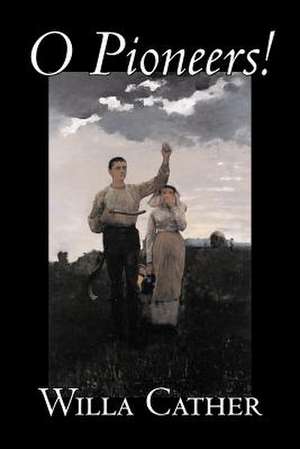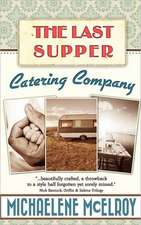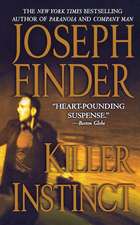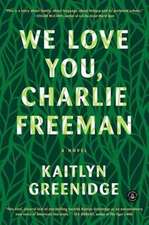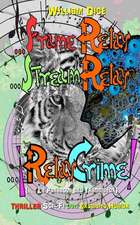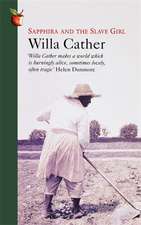O Pioneers!
Autor Willa Catheren Limba Engleză Paperback
| Toate formatele și edițiile | Preț | Express |
|---|---|---|
| Paperback (36) | 30.08 lei 22-36 zile | |
| Signet Classics – 30 apr 2012 | 30.08 lei 22-36 zile | |
| Bantam Classics – 28 feb 1989 | 34.29 lei 22-36 zile | |
| HMH Books – 30 sep 1997 | 44.26 lei 22-36 zile | |
| CREATESPACE – | 46.41 lei 22-36 zile | |
| UNION SQUARE & CO – 24 sep 2024 | 46.55 lei 22-36 zile | |
| Vintage Publishing – 5 sep 2019 | 47.42 lei 25-31 zile | +22.57 lei 5-11 zile |
| CREATESPACE – | 48.11 lei 22-36 zile | |
| CreateSpace Independent Publishing Platform – | 48.45 lei 22-36 zile | |
| CREATESPACE – | 48.45 lei 22-36 zile | |
| CREATESPACE – 30 apr 2010 | 49.43 lei 22-36 zile | |
| Mint Editions – dec 2020 | 50.65 lei 22-36 zile | |
| Penguin Books – aug 2018 | 51.82 lei 25-31 zile | +16.80 lei 5-11 zile |
| Oxford University Press – 14 aug 2008 | 52.08 lei 10-16 zile | +17.28 lei 5-11 zile |
| Vintage Publishing – 30 noi 1992 | 54.66 lei 22-36 zile | |
| Penguin Books – 31 dec 1993 | 55.89 lei 22-36 zile | |
| – | 56.88 lei 22-36 zile | |
| CreateSpace Independent Publishing Platform – | 58.71 lei 22-36 zile | |
| CREATESPACE – | 62.18 lei 22-36 zile | |
| CREATESPACE – | 62.65 lei 22-36 zile | |
| CREATESPACE – | 63.39 lei 22-36 zile | |
| CREATESPACE – | 63.39 lei 22-36 zile | |
| EMPIRE BOOKS – 31 dec 2011 | 69.96 lei 22-36 zile | |
| CreateSpace Independent Publishing Platform – | 70.37 lei 22-36 zile | |
| Large Print Press – 31 mai 2010 | 98.73 lei 22-36 zile | |
| BISON BOOKS – 31 dec 2012 | 109.48 lei 22-36 zile | |
| Digireads.com – 8 mai 2017 | 59.52 lei 43-57 zile | |
| Blurb – 9 feb 2019 | 61.10 lei 38-44 zile | |
| LIGHTNING SOURCE INC – 29 mai 2007 | 74.49 lei 38-44 zile | |
| NuVision Publications – 13 mai 2008 | 78.05 lei 38-44 zile | |
| Bibliotech Press – 11 aug 2020 | 82.73 lei 43-57 zile | |
| AEGYPAN – | 82.96 lei 43-57 zile | |
| Stonewell Press – 18 oct 2013 | 88.75 lei 43-57 zile | |
| Indoeuropeanpublishing.com – 29 feb 2012 | 90.89 lei 43-57 zile | |
| SMK Books – 23 aug 2008 | 92.54 lei 43-57 zile | |
| Roche Press – 7 iul 2008 | 128.01 lei 43-57 zile | |
| Nebraska Paperback – 31 oct 2003 | 189.11 lei 43-57 zile | |
| Hardback (4) | 60.48 lei 25-31 zile | +24.33 lei 5-11 zile |
| EVERYMAN – 30 sep 2011 | 60.48 lei 25-31 zile | +24.33 lei 5-11 zile |
| Mint Editions – 8 dec 2020 | 103.67 lei 22-36 zile | |
| SMK Books – 3 apr 2018 | 133.82 lei 43-57 zile | |
| Nebraska – 29 feb 1992 | 455.63 lei 43-57 zile |
Preț: 82.96 lei
Nou
Puncte Express: 124
Preț estimativ în valută:
15.87€ • 16.62$ • 13.13£
15.87€ • 16.62$ • 13.13£
Carte tipărită la comandă
Livrare economică 07-21 aprilie
Preluare comenzi: 021 569.72.76
Specificații
ISBN-13: 9781603120500
ISBN-10: 1603120505
Pagini: 140
Dimensiuni: 152 x 229 x 8 mm
Greutate: 0.21 kg
Editura: AEGYPAN
ISBN-10: 1603120505
Pagini: 140
Dimensiuni: 152 x 229 x 8 mm
Greutate: 0.21 kg
Editura: AEGYPAN
Notă biografică
Willa Sibert Cather (1873 - 1947) was an American writer who achieved recognition for her novels of frontier life on the Great Plains, including O Pioneers! (1913), The Song of the Lark (1915), and My Ántonia (1918). In 1923 she was awarded the Pulitzer Prize for One of Ours (1922), a novel set during World War I.
Cather grew up in Virginia and Nebraska, and graduated from the University of Nebraska-Lincoln. She lived and worked in Pittsburgh for ten years, supporting herself as a magazine editor and high school English teacher. At the age of 33 she moved to New York City, her primary home for the rest of her life, though she also traveled widely and spent considerable time at her summer residence on Grand Manan Island, New Brunswick.
Descriere
Descriere de la o altă ediție sau format:
`For the first time, perhaps, since that land emerged from the waters of geologic ages, a human face was set toward it with love and yearning. It seemed beautiful to her, rich and strong and glorious.' Willa Cather's second novel, O Pioneers! (1913) tells the story of Alexandra Bergson and her determination to save her immigrant family's Nebraska farm. Clear-headed and fiercely independent, Alexandra's passionate faith in the prairie makes her a wealthy landowner. By placing a strong, self-reliant woman at the centre of her tale, Cather gives the quintessentially American novel of the soil a radical cast. Yet, although influenced by the democratic utopianism of Walt Whitman and the serene regionalism of Sarah Orne Jewett, O Pioneers! is more than merely an elegy for the lost glories of America's pioneer past. In its rage for order and efficiency, the novel testifies to the cultural politics of the Progressive Era, the period of massive social and economic transformations that helped to modernize the United States in the years between the Civil War and World War. ABOUT THE SERIES: For over 100 years Oxford World's Classics has made available the widest range of literature from around the globe. Each affordable volume reflects Oxford's commitment to scholarship, providing the most accurate text plus a wealth of other valuable features, including expert introductions by leading authorities, helpful notes to clarify the text, up-to-date bibliographies for further study, and much more.
`For the first time, perhaps, since that land emerged from the waters of geologic ages, a human face was set toward it with love and yearning. It seemed beautiful to her, rich and strong and glorious.' Willa Cather's second novel, O Pioneers! (1913) tells the story of Alexandra Bergson and her determination to save her immigrant family's Nebraska farm. Clear-headed and fiercely independent, Alexandra's passionate faith in the prairie makes her a wealthy landowner. By placing a strong, self-reliant woman at the centre of her tale, Cather gives the quintessentially American novel of the soil a radical cast. Yet, although influenced by the democratic utopianism of Walt Whitman and the serene regionalism of Sarah Orne Jewett, O Pioneers! is more than merely an elegy for the lost glories of America's pioneer past. In its rage for order and efficiency, the novel testifies to the cultural politics of the Progressive Era, the period of massive social and economic transformations that helped to modernize the United States in the years between the Civil War and World War. ABOUT THE SERIES: For over 100 years Oxford World's Classics has made available the widest range of literature from around the globe. Each affordable volume reflects Oxford's commitment to scholarship, providing the most accurate text plus a wealth of other valuable features, including expert introductions by leading authorities, helpful notes to clarify the text, up-to-date bibliographies for further study, and much more.
Extras
Chapter One
ONE JANUARY day, thirty years ago, the little town of Hanover, anchored on a windy Nebraska tableland, was trying not to be blown away. A mist of fine snowflakes was curling and eddying about the cluster of low drab buildings huddled on the gray prairie, under a gray sky. The dwelling-houses were set about haphazard on the tough prairie sod; some of them looked as if they had been moved in overnight, and others as if they were straying off by themselves, headed straight for the open plain. None of them had any appearance of permanence, and the howling wind blew under them as well as over them. The main street was a deeply rutted road, now frozen hard, which ran from the squat red railway station and the grain "elevator" at the north end of the town to the lumber yard and the horse pond at the south end. On either side of this road straggled two uneven rows of wooden buildings; the general merchandise stores, the two banks, the drug store, the feed store, the saloon, the post-office. The board sidewalks were gray with trampled snow, but at two o'clock in the afternoon the shopkeepers, having come back from dinner, were keeping well behind their frosty windows. The children were all in school, and there was nobody abroad in the streets but a few rough-looking countrymen in coarse overcoats, with their long caps pulled down to their noses. Some of them had brought their wives to town, and now and then a red or a plaid shawl flashed out of one store into the shelter of another. At the hitch-bars along the street a few heavy work-horses, harnessed to farm wagons, shivered under their blankets. About the station everything was quiet, for there would not be another train in until night.
On the sidewalk in front of one of the stores sat a little Swede boy, crying bitterly. He was about five years old. His black cloth coat was much too big for him and made him look like a little old man. His shrunken brown flannel dress had been washed many times and left a long stretch of stocking between the hem of his skirt and the tops of his clumsy, copper-toed shoes. His cap was pulled down over his ears; his nose and his chubby cheeks were chapped and red with cold. He cried quietly, and the few people who hurried by did not notice him. He was afraid to stop any one, afraid to go into the store and ask for help, so he sat wringing his long sleeves and looking up a telegraph pole beside him, whimpering, "My kitten, oh, my kitten! Her will fweeze!" At the top of the pole crouched a shivering gray kitten, mewing faintly and clinging desperately to the wood with her claws. The boy had been left at the store while his sister went to the doctor's office, and in her absence a dog had chased his kitten up the pole. The little creature had never been so high before, and she was too frightened to move. Her master was sunk in despair. He was a little country boy, and this village was to him a very strange and perplexing place, where people wore fine clothes and had hard hearts. He always felt shy and awkward here, and wanted to hide behind things for fear some one might laugh at him. Just now, he was too unhappy to care who laughed. At last he seemed to see a ray of hope: his sister was coming, and he got up and ran toward her in his heavy shoes.
His sister was a tall, strong girl, and she walked rapidly and resolutely, as if she knew exactly where she was going and what she was going to do next. She wore a man's long ulster (not as if it were an affliction, but as if it were very comfortable and belonged to her; carried it like a young soldier), and a round plush cap, tied down with a thick veil. She had a serious, thoughtful face, and her clear, deep blue eyes were fixed intently on the distance, without seeming to see anything, as if she were in trouble. She did not notice the little boy until he pulled her by the coat. Then she stopped short and stooped down to wipe his wet face.
"Why, Emil! I told you to stay in the store and not to come out. What is the matter with you?"
"My kitten, sister, my kitten! A man put her out, and a dog chased her up there." His forefinger, projecting from the sleeve of his coat, pointed up to the wretched little creature on the pole.
"Oh, Emil! Didn't I tell you she'd get us into trouble of some kind, if you brought her? What made you tease me so? But there, I ought to have known better myself." She went to the foot of the pole and held out her arms, crying, "Kitty, kitty, kitty," but the kitten only mewed and faintly waved its tail. Alexandra turned away decidedly. "No, she won't come down. Somebody will have to go up after her. I saw the Linstrums' wagon in town. I'll go and see if I can find Carl. Maybe he can do something. Only you must stop crying, or I won't go a step. Where's your comforter? Did you leave it in the store? Never mind. Hold still, till I put this on you."
She unwound the brown veil from her head and tied it about his throat. A shabby little traveling man, who was just then coming out of the store on his way to the saloon, stopped and gazed stupidly at the shining mass of hair she bared when she took off her veil; two thick braids, pinned about her head in the German way, with a fringe of reddish-yellow curls blowing out from under her cap. He took his cigar out of his mouth and held the wet end between the fingers of his woolen glove. "My God, girl, what a head of hair!" he exclaimed, quite innocently and foolishly. She stabbed him with a glance of Amazonian fierceness and drew in her lower lip—most unnecessary severity. It gave the little clothing drummer such a start that he actually let his cigar fall to the sidewalk and went off weakly in the teeth of the wind to the saloon. His hand was still unsteady when he took his glass from the bartender. His feeble flirtatious instincts had been crushed before, but never so mercilessly. He felt cheap and ill-used, as if some one had taken advantage of him. When a drummer had been knocking about in little drab towns and crawling across the wintry country in dirty smoking-cars, was he to be blamed if, when he chanced upon a fine human creature, he suddenly wished himself more of a man?
While the little drummer was drinking to recover his nerve, Alexandra hurried to the drug store as the most likely place to find Carl Linstrum. There he was, turning over a portfolio of chromo "studies" which the druggist sold to the Hanover women who did china-painting. Alexandra explained her predicament, and the boy followed her to the corner, where Emil still sat by the pole.
"I'll have to go up after her, Alexandra. I think at the depot they have some spikes I can strap on my feet. Wait a minute." Carl thrust his hands into his pockets, lowered his head, and darted up the street against the north wind. He was a tall boy of fifteen, slight and narrow-chested. When he came back with the spikes, Alexandra asked him what he had done with his overcoat.
"I left it in the drug store. I couldn't climb in it, anyhow. Catch me if I fall, Emil," he called back as he began his ascent. Alexandra watched him anxiously; the cold was bitter enough on the ground. The kitten would not budge an inch. Carl had to go to the very top of the pole, and then had some difficulty in tearing her from her hold. When he reached the ground, he handed the cat to her tearful little master. "Now go into the store with her, Emil, and get warm." He opened the door for the child.
"Wait a minute, Alexandra. Why can't I drive for you as far as our place? It's getting colder every minute. Have you seen the doctor?"
"Yes. He is coming over to-morrow. But he says father can't get better; can't get well." The girl's lip trembled. She looked fixedly up the bleak street as if she were gathering her strength to face something, as if she were trying with all her might to grasp a situation which, no matter how painful, must be met and dealt with somehow. The wind flapped the skirts of her heavy coat about her.
Carl did not say anything, but she felt his sympathy. He, too, was lonely. He was a thin, frail boy, with brooding dark eyes, very quiet in all his movements. There was a delicate pallor in his thin face, and his mouth was too sensitive for a boy's. The lips had already a little curl of bitterness and skepticism. The two friends stood for a few moments on the windy street corner, not speaking a word, as two travelers, who have lost their way, sometimes stand and admit their perplexity in silence. When Carl turned away he said, "I'll see to your team." Alexandra went into the store to have her purchases packed in the egg-boxes, and to get warm before she set out on her long cold drive.
When she looked for Emil, she found him sitting on a step of the staircase that led up to the clothing and carpet department. He was playing with a little Bohemian girl, Marie Tovesky, who was tying her handkerchief over the kitten's head for a bonnet. Marie was a stranger in the country, having come from Omaha with her mother to visit her uncle, Joe Tovesky. She was a dark child, with brown curly hair, like a brunette doll's, a coaxing little red mouth, and round, yellow-brown eyes. Every one noticed her eyes; the brown iris had golden glints that made them look like gold-stone, or, in softer lights, like that Colorado mineral called tiger-eye.
The country children thereabouts wore their dresses to their shoe-tops, but this city child was dressed in what was then called the "Kate Greenaway" manner, and her red cashmere frock, gathered full from the yoke, came almost to the floor. This, with her poke bonnet, gave her the look of a quaint little woman. She had a white fur tippet about her neck and made no fussy objections when Emil fingered it admiringly. Alexandra had not the heart to take him away from so pretty a playfellow, and she let them tease the kitten together until Joe Tovesky came in noisily and picked up his little niece, setting her on his shoulder for every one to see. His children were all boys, and he adored this little creature. His cronies formed a circle about him, admiring and teasing the little girl, who took their jokes with great good nature. They were all delighted with her, for they seldom saw so pretty and carefully nurtured a child. They told her that she must choose one of them for a sweetheart, and each began pressing his suit and offering her bribes: candy, and little pigs, and spotted calves. She looked archly into the big, brown, mustached faces, smelling of spirits and tobacco, then she ran her tiny forefinger delicately over Joe's bristly chin and said, "Here is my sweetheart."
The Bohemians roared with laughter, and Marie's uncle hugged her until she cried, "Please don't, Uncle Joe! You hurt me." Each of Joe's friends gave her a bag of candy, and she kissed them all around, though she did not like country candy very well. Perhaps that was why she bethought herself of Emil. "Let me down, Uncle Joe," she said, "I want to give some of my candy to that nice little boy I found." She walked graciously over to Emil, followed by her lusty admirers, who formed a new circle and teased the little boy until he hid his face in his sister's skirts, and she had to scold him for being such a baby.
The farm people were making preparations to start for home. The women were checking over their groceries and pinning their big red shawls about their heads. The men were buying tobacco and candy with what money they had left, were showing each other new boots and gloves and blue flannel shirts. Three big Bohemians were drinking raw alcohol, tinctured with oil of cinnamon. This was said to fortify one effectually against the cold, and they smacked their lips after each pull at the flask. Their volubility drowned every other noise in the place, and the overheated store sounded of their spirited language as it reeked of pipe smoke, damp woolens, and kerosene.
Carl came in, wearing his overcoat and carrying a wooden box with a brass handle. "Come," he said, "I've fed and watered your team, and the wagon is ready." He carried Emil out and tucked him down in the straw in the wagon-box. The heat had made the little boy sleepy, but he still clung to his kitten.
"You were awful good to climb so high and get my kitten, Carl. When I get big I'll climb and get little boys' kittens for them," he murmured drowsily. Before the horses were over the first hill, Emil and his cat were both fast asleep.
Although it was only four o'clock, the winter day was fading. The road led southwest, toward the streak of pale, watery light that glimmered in the leaden sky. The light fell upon the two sad young faces that were turned mutely toward it: upon the eyes of the girl, who seemed to be looking with such anguished perplexity into the future; upon the sombre eyes of the boy, who seemed already to be looking into the past. The little town behind them had vanished as if it had never been, had fallen behind the swell of the prairie, and the stern frozen country received them into its bosom. The homesteads were few and far apart; here and there a windmill gaunt against the sky, a sod house crouching in a hollow. But the great fact was the land itself, which seemed to overwhelm the little beginnings of human society that struggled in its sombre wastes. It was from facing this vast hardness that the boy's mouth had become so bitter; because he felt that men were too weak to make any mark here, that the land wanted to be let alone, to preserve its own fierce strength, its peculiar, savage kind of beauty, its uninterrupted mournfulness.
The wagon jolted along over the frozen road. The two friends had less to say to each other than usual, as if the cold had somehow penetrated to their hearts.
From the Paperback edition.
ONE JANUARY day, thirty years ago, the little town of Hanover, anchored on a windy Nebraska tableland, was trying not to be blown away. A mist of fine snowflakes was curling and eddying about the cluster of low drab buildings huddled on the gray prairie, under a gray sky. The dwelling-houses were set about haphazard on the tough prairie sod; some of them looked as if they had been moved in overnight, and others as if they were straying off by themselves, headed straight for the open plain. None of them had any appearance of permanence, and the howling wind blew under them as well as over them. The main street was a deeply rutted road, now frozen hard, which ran from the squat red railway station and the grain "elevator" at the north end of the town to the lumber yard and the horse pond at the south end. On either side of this road straggled two uneven rows of wooden buildings; the general merchandise stores, the two banks, the drug store, the feed store, the saloon, the post-office. The board sidewalks were gray with trampled snow, but at two o'clock in the afternoon the shopkeepers, having come back from dinner, were keeping well behind their frosty windows. The children were all in school, and there was nobody abroad in the streets but a few rough-looking countrymen in coarse overcoats, with their long caps pulled down to their noses. Some of them had brought their wives to town, and now and then a red or a plaid shawl flashed out of one store into the shelter of another. At the hitch-bars along the street a few heavy work-horses, harnessed to farm wagons, shivered under their blankets. About the station everything was quiet, for there would not be another train in until night.
On the sidewalk in front of one of the stores sat a little Swede boy, crying bitterly. He was about five years old. His black cloth coat was much too big for him and made him look like a little old man. His shrunken brown flannel dress had been washed many times and left a long stretch of stocking between the hem of his skirt and the tops of his clumsy, copper-toed shoes. His cap was pulled down over his ears; his nose and his chubby cheeks were chapped and red with cold. He cried quietly, and the few people who hurried by did not notice him. He was afraid to stop any one, afraid to go into the store and ask for help, so he sat wringing his long sleeves and looking up a telegraph pole beside him, whimpering, "My kitten, oh, my kitten! Her will fweeze!" At the top of the pole crouched a shivering gray kitten, mewing faintly and clinging desperately to the wood with her claws. The boy had been left at the store while his sister went to the doctor's office, and in her absence a dog had chased his kitten up the pole. The little creature had never been so high before, and she was too frightened to move. Her master was sunk in despair. He was a little country boy, and this village was to him a very strange and perplexing place, where people wore fine clothes and had hard hearts. He always felt shy and awkward here, and wanted to hide behind things for fear some one might laugh at him. Just now, he was too unhappy to care who laughed. At last he seemed to see a ray of hope: his sister was coming, and he got up and ran toward her in his heavy shoes.
His sister was a tall, strong girl, and she walked rapidly and resolutely, as if she knew exactly where she was going and what she was going to do next. She wore a man's long ulster (not as if it were an affliction, but as if it were very comfortable and belonged to her; carried it like a young soldier), and a round plush cap, tied down with a thick veil. She had a serious, thoughtful face, and her clear, deep blue eyes were fixed intently on the distance, without seeming to see anything, as if she were in trouble. She did not notice the little boy until he pulled her by the coat. Then she stopped short and stooped down to wipe his wet face.
"Why, Emil! I told you to stay in the store and not to come out. What is the matter with you?"
"My kitten, sister, my kitten! A man put her out, and a dog chased her up there." His forefinger, projecting from the sleeve of his coat, pointed up to the wretched little creature on the pole.
"Oh, Emil! Didn't I tell you she'd get us into trouble of some kind, if you brought her? What made you tease me so? But there, I ought to have known better myself." She went to the foot of the pole and held out her arms, crying, "Kitty, kitty, kitty," but the kitten only mewed and faintly waved its tail. Alexandra turned away decidedly. "No, she won't come down. Somebody will have to go up after her. I saw the Linstrums' wagon in town. I'll go and see if I can find Carl. Maybe he can do something. Only you must stop crying, or I won't go a step. Where's your comforter? Did you leave it in the store? Never mind. Hold still, till I put this on you."
She unwound the brown veil from her head and tied it about his throat. A shabby little traveling man, who was just then coming out of the store on his way to the saloon, stopped and gazed stupidly at the shining mass of hair she bared when she took off her veil; two thick braids, pinned about her head in the German way, with a fringe of reddish-yellow curls blowing out from under her cap. He took his cigar out of his mouth and held the wet end between the fingers of his woolen glove. "My God, girl, what a head of hair!" he exclaimed, quite innocently and foolishly. She stabbed him with a glance of Amazonian fierceness and drew in her lower lip—most unnecessary severity. It gave the little clothing drummer such a start that he actually let his cigar fall to the sidewalk and went off weakly in the teeth of the wind to the saloon. His hand was still unsteady when he took his glass from the bartender. His feeble flirtatious instincts had been crushed before, but never so mercilessly. He felt cheap and ill-used, as if some one had taken advantage of him. When a drummer had been knocking about in little drab towns and crawling across the wintry country in dirty smoking-cars, was he to be blamed if, when he chanced upon a fine human creature, he suddenly wished himself more of a man?
While the little drummer was drinking to recover his nerve, Alexandra hurried to the drug store as the most likely place to find Carl Linstrum. There he was, turning over a portfolio of chromo "studies" which the druggist sold to the Hanover women who did china-painting. Alexandra explained her predicament, and the boy followed her to the corner, where Emil still sat by the pole.
"I'll have to go up after her, Alexandra. I think at the depot they have some spikes I can strap on my feet. Wait a minute." Carl thrust his hands into his pockets, lowered his head, and darted up the street against the north wind. He was a tall boy of fifteen, slight and narrow-chested. When he came back with the spikes, Alexandra asked him what he had done with his overcoat.
"I left it in the drug store. I couldn't climb in it, anyhow. Catch me if I fall, Emil," he called back as he began his ascent. Alexandra watched him anxiously; the cold was bitter enough on the ground. The kitten would not budge an inch. Carl had to go to the very top of the pole, and then had some difficulty in tearing her from her hold. When he reached the ground, he handed the cat to her tearful little master. "Now go into the store with her, Emil, and get warm." He opened the door for the child.
"Wait a minute, Alexandra. Why can't I drive for you as far as our place? It's getting colder every minute. Have you seen the doctor?"
"Yes. He is coming over to-morrow. But he says father can't get better; can't get well." The girl's lip trembled. She looked fixedly up the bleak street as if she were gathering her strength to face something, as if she were trying with all her might to grasp a situation which, no matter how painful, must be met and dealt with somehow. The wind flapped the skirts of her heavy coat about her.
Carl did not say anything, but she felt his sympathy. He, too, was lonely. He was a thin, frail boy, with brooding dark eyes, very quiet in all his movements. There was a delicate pallor in his thin face, and his mouth was too sensitive for a boy's. The lips had already a little curl of bitterness and skepticism. The two friends stood for a few moments on the windy street corner, not speaking a word, as two travelers, who have lost their way, sometimes stand and admit their perplexity in silence. When Carl turned away he said, "I'll see to your team." Alexandra went into the store to have her purchases packed in the egg-boxes, and to get warm before she set out on her long cold drive.
When she looked for Emil, she found him sitting on a step of the staircase that led up to the clothing and carpet department. He was playing with a little Bohemian girl, Marie Tovesky, who was tying her handkerchief over the kitten's head for a bonnet. Marie was a stranger in the country, having come from Omaha with her mother to visit her uncle, Joe Tovesky. She was a dark child, with brown curly hair, like a brunette doll's, a coaxing little red mouth, and round, yellow-brown eyes. Every one noticed her eyes; the brown iris had golden glints that made them look like gold-stone, or, in softer lights, like that Colorado mineral called tiger-eye.
The country children thereabouts wore their dresses to their shoe-tops, but this city child was dressed in what was then called the "Kate Greenaway" manner, and her red cashmere frock, gathered full from the yoke, came almost to the floor. This, with her poke bonnet, gave her the look of a quaint little woman. She had a white fur tippet about her neck and made no fussy objections when Emil fingered it admiringly. Alexandra had not the heart to take him away from so pretty a playfellow, and she let them tease the kitten together until Joe Tovesky came in noisily and picked up his little niece, setting her on his shoulder for every one to see. His children were all boys, and he adored this little creature. His cronies formed a circle about him, admiring and teasing the little girl, who took their jokes with great good nature. They were all delighted with her, for they seldom saw so pretty and carefully nurtured a child. They told her that she must choose one of them for a sweetheart, and each began pressing his suit and offering her bribes: candy, and little pigs, and spotted calves. She looked archly into the big, brown, mustached faces, smelling of spirits and tobacco, then she ran her tiny forefinger delicately over Joe's bristly chin and said, "Here is my sweetheart."
The Bohemians roared with laughter, and Marie's uncle hugged her until she cried, "Please don't, Uncle Joe! You hurt me." Each of Joe's friends gave her a bag of candy, and she kissed them all around, though she did not like country candy very well. Perhaps that was why she bethought herself of Emil. "Let me down, Uncle Joe," she said, "I want to give some of my candy to that nice little boy I found." She walked graciously over to Emil, followed by her lusty admirers, who formed a new circle and teased the little boy until he hid his face in his sister's skirts, and she had to scold him for being such a baby.
The farm people were making preparations to start for home. The women were checking over their groceries and pinning their big red shawls about their heads. The men were buying tobacco and candy with what money they had left, were showing each other new boots and gloves and blue flannel shirts. Three big Bohemians were drinking raw alcohol, tinctured with oil of cinnamon. This was said to fortify one effectually against the cold, and they smacked their lips after each pull at the flask. Their volubility drowned every other noise in the place, and the overheated store sounded of their spirited language as it reeked of pipe smoke, damp woolens, and kerosene.
Carl came in, wearing his overcoat and carrying a wooden box with a brass handle. "Come," he said, "I've fed and watered your team, and the wagon is ready." He carried Emil out and tucked him down in the straw in the wagon-box. The heat had made the little boy sleepy, but he still clung to his kitten.
"You were awful good to climb so high and get my kitten, Carl. When I get big I'll climb and get little boys' kittens for them," he murmured drowsily. Before the horses were over the first hill, Emil and his cat were both fast asleep.
Although it was only four o'clock, the winter day was fading. The road led southwest, toward the streak of pale, watery light that glimmered in the leaden sky. The light fell upon the two sad young faces that were turned mutely toward it: upon the eyes of the girl, who seemed to be looking with such anguished perplexity into the future; upon the sombre eyes of the boy, who seemed already to be looking into the past. The little town behind them had vanished as if it had never been, had fallen behind the swell of the prairie, and the stern frozen country received them into its bosom. The homesteads were few and far apart; here and there a windmill gaunt against the sky, a sod house crouching in a hollow. But the great fact was the land itself, which seemed to overwhelm the little beginnings of human society that struggled in its sombre wastes. It was from facing this vast hardness that the boy's mouth had become so bitter; because he felt that men were too weak to make any mark here, that the land wanted to be let alone, to preserve its own fierce strength, its peculiar, savage kind of beauty, its uninterrupted mournfulness.
The wagon jolted along over the frozen road. The two friends had less to say to each other than usual, as if the cold had somehow penetrated to their hearts.
From the Paperback edition.
Recenzii
The land belongs to the future... that's the way it seems to me....I might as well try to will the sunset over there to my brother's children. We come and go, but the land is always here. And the people who love it and understand it are the people who own it -- for a little while."
O Pioneers! (1913) was Willa Cather's first great novel, and to many it remains her unchallenged masterpiece. No other work of fiction so faithfully conveys both the sharp physical realities and the mythic sweep of the transformation of the American frontier -- and the transformation of the people who settled it. Cather's heroine is Alexandra Bergson, who arrives on the wind-blasted prairie of Hanover, Nebraska, as a girl and grows up to make it a prosperous farm. But this archetypal success story is darkened by loss, and Alexandra's devotion to the land may come at the cost of love itself.
At once a sophisticated pastoral and a prototype for later feminist novels, O Pioneers! is a work in which triumph is inextricably enmeshed with tragedy, a story of people who do not claim a land so much as they submit to it and, in the process, become greater than they were.
O Pioneers! (1913) was Willa Cather's first great novel, and to many it remains her unchallenged masterpiece. No other work of fiction so faithfully conveys both the sharp physical realities and the mythic sweep of the transformation of the American frontier -- and the transformation of the people who settled it. Cather's heroine is Alexandra Bergson, who arrives on the wind-blasted prairie of Hanover, Nebraska, as a girl and grows up to make it a prosperous farm. But this archetypal success story is darkened by loss, and Alexandra's devotion to the land may come at the cost of love itself.
At once a sophisticated pastoral and a prototype for later feminist novels, O Pioneers! is a work in which triumph is inextricably enmeshed with tragedy, a story of people who do not claim a land so much as they submit to it and, in the process, become greater than they were.
Textul de pe ultima copertă
The Land belongs to the future... that's the way it seems to me... I might as well try to will the sunset over there to my brother's children. We come and go, but the land is always here. And the people who love it and understand it are the people who own it--for a little while.
Cuprins
Part I - The Wild Land
Part II - Neighboring Fields
Part III - Winter Memories
Part IV - The White Mulberry Tree
Part V - Alexandra
Part II - Neighboring Fields
Part III - Winter Memories
Part IV - The White Mulberry Tree
Part V - Alexandra
